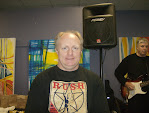The setup was fairly simple consisting of just 3 - wireless vocal mics, 1 - wired mic, and a stereo feed from a DJ mix. The 32 channel console was overkill for the small amount of inputs but, it had all the processing built-in allowing for an easier setup and no separate FOH rack required.
During the evening, I was learning as I mixed the show. After a couple of sets, I was starting to get the hang of how the mixer worked within the different mixing layers. I was using the onboard buttons, dials, and faders to control the mix. Usually, Steve would use this mixer wirelessly with his laptop computer. That way he never has to run any kind of snake cabling.
I was definitely aware of the positive things a digital mixer has and can do. While doing the mix, I discovered some shortcuts to allow me to make changes to the mix quickly and without using the laptop computer. I liked having the main controls onboard the console with mostly direct selection to them when required.
During the show, I did have some technical difficulties that were addressed quickly so that the show would go on. The big one was when the AC outlet went down where the mixer, wireless mic units and one power amp were plugged into. I moved the AC cable to another AC outlet and problem solved. I turn on the digital mixer again, let it reboot, and then I was back in business. That is probably the only thing I don't like about digital mixers. With an analog console, the power would come back on and no reboot required.
I am still very much a big fan of analog mixing consoles. For some projects, a simple, effective analog mixer is perfect for the job. I don't think analog consoles will go away anytime soon. For some sound engineers, analog is still the preferred mixer type to use. Easy to hookup the other components to and all the controls are easily accessible on the console. No menus and no mixing layers to use.
Also, the amount of analog mixing consoles for sale on the online classifieds is staggering. Right now, people are selling great analog consoles for a small fraction of their original purchase price. A number of the sound production companies are selling off their older inventory of analog consoles since most have changed over to digital mixers.With all the great deals out there online, you could put together an awesome, analog mix system for an inexpensive price compared to 10 or more years ago.
I know that the analog consoles always weigh more than the digital ones however, the larger analog consoles would make great additions to certain venues as installed mixers. Venues like bars, clubs, theatres, churches, home studio, rehearsal spaces, community centres, etc. Analog consoles are not dead yet!
I know that the analog consoles always weigh more than the digital ones however, the larger analog consoles would make great additions to certain venues as installed mixers. Venues like bars, clubs, theatres, churches, home studio, rehearsal spaces, community centres, etc. Analog consoles are not dead yet!
Recently, I researched a new digital mixer, the Allen and Heath Qu-16. I watched some product videos about it, and I was quite impressed with the design, the operations, and the ease of use shown in the video segment. This particular mixer is a 19" rackmountable console with all the features built-in that would handle many different mixing scenarios effectively. Check out the video below for an overview of the new Allen and Heath Qu-16 Digital Mixer:
The Qu-16 has some optional gear that can work in tandem with the mixer itself. There is the mic input stage box that can connect to the Qu-16 via CAT5E cabling. No more need for a copper, snake cable. The Qu-16 is also compatible with the Allen and Heath ME personal monitor mixing system allowing performers to craft their own monitor mixes using a controller onstage. There are some really great features on the console. The cost of this mixer will be more than an equivalent analog console but, with all the processing built-in, you can leave the FOH rack at home.
The Qu-16 has some optional gear that can work in tandem with the mixer itself. There is the mic input stage box that can connect to the Qu-16 via CAT5E cabling. No more need for a copper, snake cable. The Qu-16 is also compatible with the Allen and Heath ME personal monitor mixing system allowing performers to craft their own monitor mixes using a controller onstage. There are some really great features on the console. The cost of this mixer will be more than an equivalent analog console but, with all the processing built-in, you can leave the FOH rack at home.
In my opinion, I believe that both analog and digital mixers will co-exist together for a long time to come. Each type has its benefits and faults but, both accomplish the same results.
If you are not familiar with the Yamaha LS9-32 digital mixing console, here it is:
Here is an example of an analog console for sale at such a great price and it makes it harder to resist buying one of the older boards. This is the Yamaha MC2404II 24 channel, 4 buss, analog mixing console. The seller is asking only $250.00 (including the road case)! Not a bad deal consider the original sell price would have been likely $10000.00 or more when it was new.








